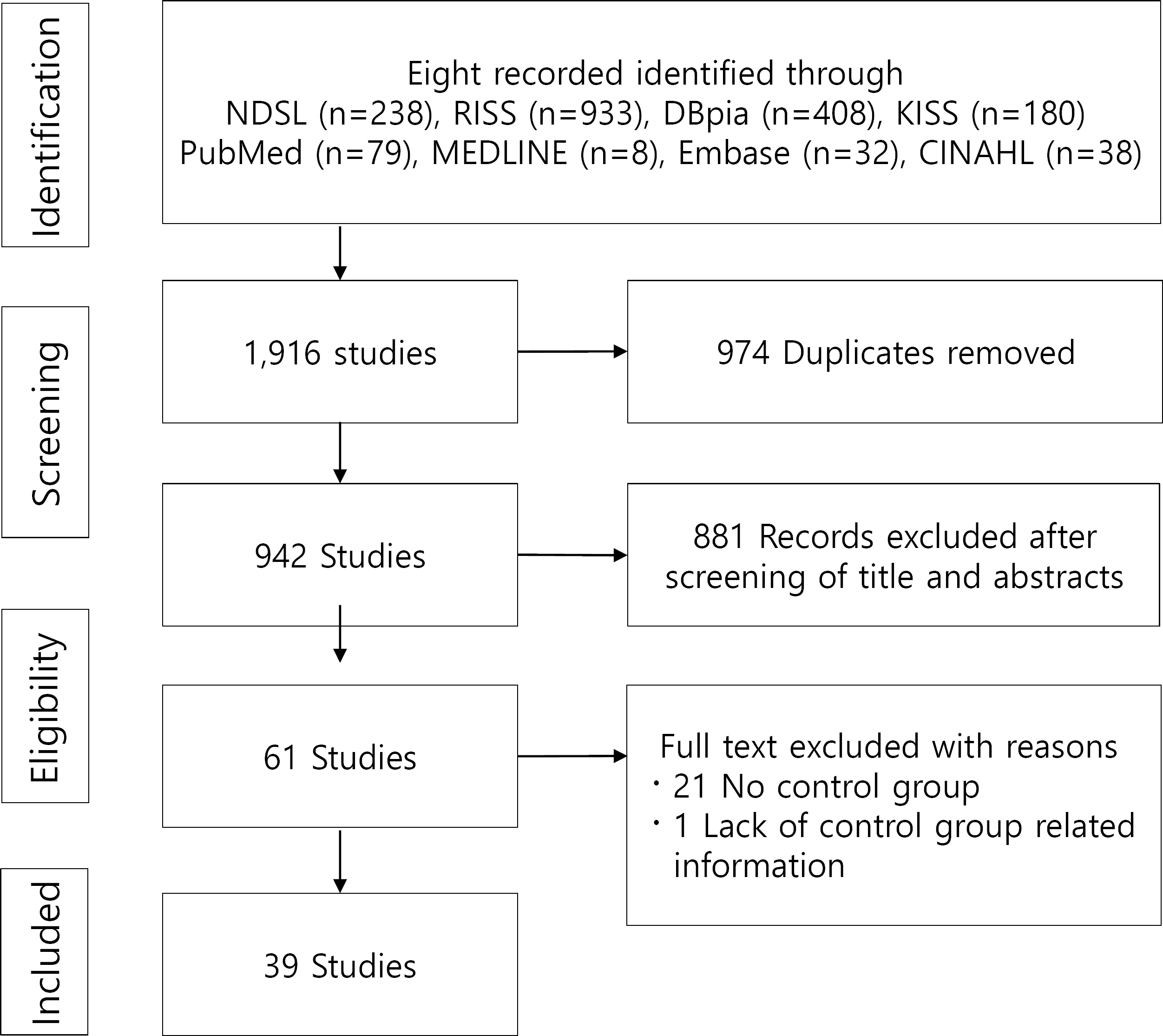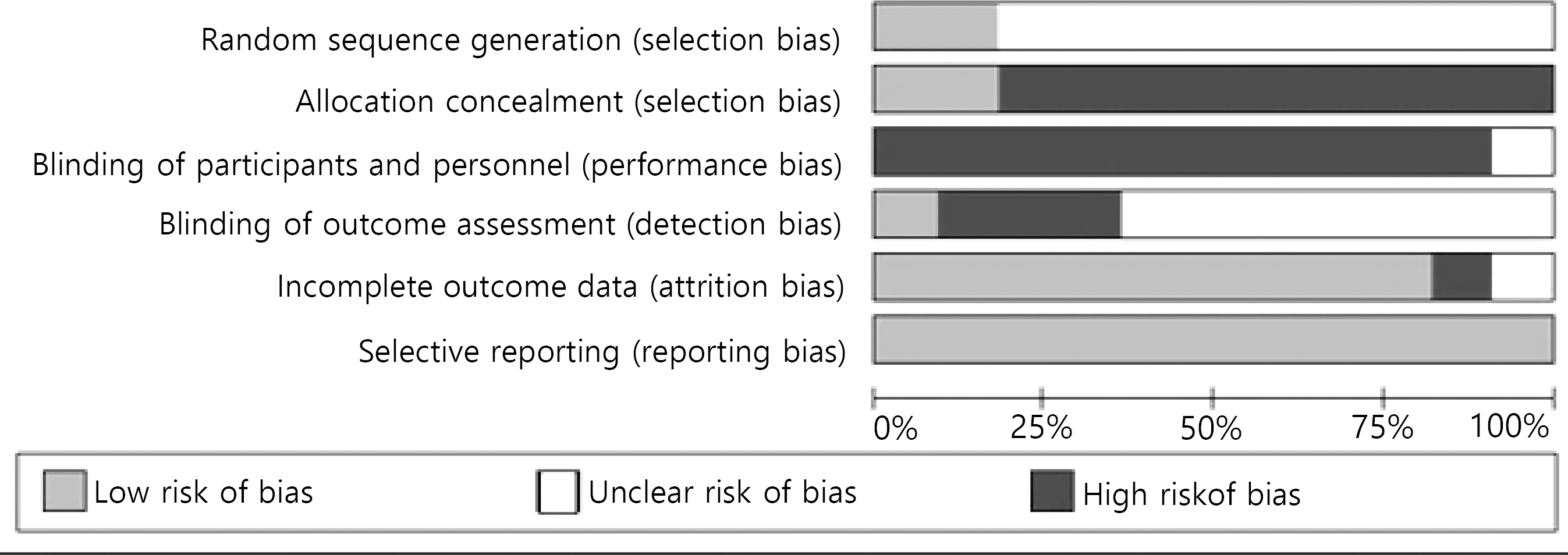J Korean Soc Matern Child Health.
2021 Apr;25(2):99-108. 10.21896/jksmch.2021.25.2.99.
Intervention for Married Immigrant Women in Korea: A Systematic Review
- Affiliations
-
- 1Department of Nursing, Korea National Open University, Seoul, Korea
- 2Department of Nursing, Kyungbok University, Namyangju, Korea
- 3College of Nursing, Seoul National University, Seoul, Korea
- KMID: 2515647
- DOI: http://doi.org/10.21896/jksmch.2021.25.2.99
Abstract
- Purpose
This study aimed to review the intervention programs designed for married immigrant women living in Korea.
Methods
A total of 39 articles published from 2010 to 2020 were selected and analyzed using domestic and international web-based academic databases according to a systematic literature review procedure. The selected studies were evaluated for quality according to RoB (Risk of Bias) and RoBANS (Risk of Bias for Non-randomized studies). Additionally, intervention programs and outcome variables were based on the Nursing Intervention Classification (NIC) and Nursing Outcome Classification (NOC) system.
Results
According to the NIC categories, 69.2% of the interventions were in the behavioral domain, and 23.1% were in the family domain. The outcome variables primarily measured in NOC categories were psychological well-being (45.8%), health knowledge (11.0%), and health belief (10.2%). The quality of the selected studies was low overall in random sequence generation, allocation concealment, blinding of participants and personnel, and blinding of outcome data in randomized controlled trials (RCT) studies and confounding variables, blinding of outcome data, and incomplete outcome bias in non-RCT studies.
Conclusion
Based on the results of this study, future studies will have to consider the characteristics of the subjects, life cycle, daily life, or language limitations. In addition, it is necessary to develop high-quality programs through continuous research on currently and frequently used interventions and outcome variables and on other various mediations and to verify the outcome variables.
Figure
Reference
-
Ahn HM., Kim MO. Analysis of health related intervention research for married immigrant women. J Digital Converg. 2016. 14:245–56.
ArticleAhn JA., Kim T., Roh EH., Song JE. Health of international marriage immigrant women in South Korea: a systematic review. J Immigr Minor Health. 2018. 20:717–28.
ArticleAhn OH., Jeon MS., Hwang YY., Kim KA., Youn MS. An analysis of articles for international marriage immigrant women related to health. J Agri Med Community Health. 2010. 35:134–50.
ArticleButcher HK., Bulechek GM., Dochterman JM., Wagner CM. Nursing interventions classification (NIC). 7th ed. Saint Louis: Elsevier; 2018. Jeong SH. Group art therapy program on married migrant women–s depression, self-esteem, and marital satisfaction. Korean Assoc Clin Healing Arts. 2013. 2:61–94.Jun HJ., Min SH., Lee MY., Choi HY. Path of the variables to migrant women–s families– health. Korean J Family Welf. 2009. 14:5–27.Kim HJ., Kim JM. Cognitive behavioral therapy for improving parenting efficacy of married immigrant women. J Korean Home Manag Assoc. 2015. 33:135–48.
ArticleKim J., Kim NC. Effects of birth control empowerment program for married immigrant Vietnamese women in South Korea. Korean J Women Health Nurs. 2017. 23:1–10.
ArticleKim JH. The effect of folk song-oriented music therapy program on the reduction of cultural adaptation stress and depression in Chinese migrant women. Korean J Interdiscipl Ther. 2011. 3:21–32.Kim SH., Noh YG. Influence of spousal support on the relationship between acculturative stress and sense of parenting competence among married Vietnamese immigrant women. Korean J of Women Health Nurs. 2018. 24:174–84.
ArticleKim SY., Park JE., Seo HJ., Seo HS., Son HJ., Shin CM, et al. NECA–s guidance for undertaking systematic reviews and meta-analyses for intervention. Seoul (Korea): National Evidence-based healthcare Collaborating Agency;2011.Kim TI., Kim JY., Choi SM., Jung GH. Analysis of intervention studies for married immigrant women. J Korean Acad Community Health Nursing. 2013. 24:172–84.
ArticleLee EA. Urban marriage migrant women–s role of a mother and their identities: focusing on the experience of child education. J Korean Womens Stud. 2013. 29:115–46.Lee HK., Jeon HI. The effects of perceived social support on marital satisfaction in married immigrant women: focused on the mediating effect of acculturative stress. Korean J Family Welf. 2013. 18:413–32.
ArticleLee MO., Kim SH. Meta-analysis about the effectiveness of intervention programs for married immigrant women. Korean J Women Health Nurs. 2015. 21:342–54.
ArticleLee SH., Park YC., Hwang J., Im JJ., Ahn D. Mental health of intermarried immigrant women and their children in South Korea. J Immigrant Minority Health. 2014. 16:77–85.
ArticleLee SO., Kim GS., Choi YK. Nursing process. Seoul (Korea): Korea National Open University;2016.Ministry of Gender Equality and Family. Raw-data of national survey of multicultural families 2019. Seoul (Korea): Ministry of Gender Equality and Family;2020.Ministry of Justice, Korea Immigration Service. Korea immigration service statistics 2019. Gwacheon (Korea): Ministry of Justice, Korea Immigration Service;2020.Ministry of the Interior and Safety. Foreign residents of local governments in 2018. Ministry of the interior and safety [Internet]. Sejong (Korea): Ministry of the Interior and Safety;2019 Oct. [cited 2021 Jan 5]. Available from:. https://www.mois.go.kr/frt/bbs/type001/commonSelectBoardArticle.do?bbsId=BBSMSTR_000000000014&nttId=73857.Moorhead S., Swanson E., Johnson M., Maas ML. Nursing outcomes classification (NOC): measurement of health outcomes. 6th ed.Saint Louis: Elsevier;2018.Park MN., Choi SY. Development of reproductive health program and identification of effect for married women immigrants. J Korean Acad Nurs. 2014. 44:248–58.
ArticleSeo IJ., Park JS. Health promoting behaviors, health problems and self-rated health status in female marriage immigrant in Korea. J Digital Converg. 2013. 11:369–82.Simpson RL. What–s in a name? The taxonomy and nomenclature puzzle, part 2. Nurs Manage. 2003. 34:12–6.
ArticleYoo HS., Jang IS., Jeon MS., Kim HG., Nam HK., Park HS, et al. Validation of Korean nomenclature of NOC: Focused on 260 outcomes. J Korean Acad Nurs Adm. 2002. 8:221–38.
- Full Text Links
- Actions
-
Cited
- CITED
-
- Close
- Share
- Similar articles
-
- The Related Factors on Cervical Cancer Screening Intention among Married Immigrant Women based on the Health Belief Model
- Meta-analysis about the Effectiveness of Intervention Programs for Married Immigrant Women
- Analysis of Intervention Studies for Married Immigrant Women
- Pap Smear Screening Participation Behavior and Related Factors in Married Immigrant Women
- Concept Analysis of Married Immigrant Women Acculturation to Korean Culture



